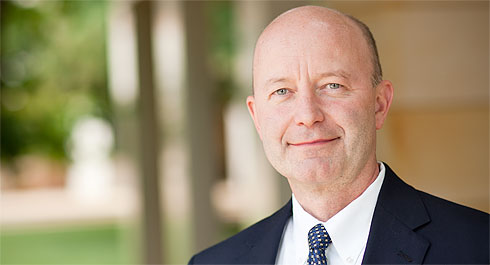Serving the community

Steven Virgil is director of the School of Law's new Community Law and Business Clinic. Prior to joining the law faculty last summer, he was the director of a similar clinic at Creighton University School of Law in Omaha, Neb.
The School of Law’s new Community Law and Business Clinic provides pro bono legal and business consultancy services to small business owners and nonprofit organizations. The clinic, which opened in November, plans to host open “Ask A Lawyer” sessions on a regular basis; the first one is scheduled for Feb. 18 from noon to 3 p.m. at the clinic’s office in the historic Wachovia building in downtown Winston-Salem. To schedule an appointment, contact the clinic at (336) 631-1953. Steven Virgil, an associate clinical professor and director of the clinic, explains more about the clinic.
What is the purpose of the Community Law and Business Clinic?
To educate our students and to serve the community.
Where did the idea for the clinic originate?
The CL&BC started as a student-led effort. Students saw a need for clinical education programs that focus on transactional and business practice, in contrast to the litigation-focused clinics that have been such a great asset to the school for many years. When Dean Blake Morant learned of the students’ interest, he championed the idea with the University, which quickly supported the effort.
The mission of the clinic is consistent with the University’s overall interest in community engagement and scholarship, as well as its focus on preparing our students to be successful in an increasingly complex business world.
Who will be involved in the clinic?
We have created spaces for 12 students, with eight of those reserved for law students and four for MBA students, although there is flexibility and we will work to expand the number of students each semester. In addition to our professional students, we have created several spaces for undergraduates who are interested in business or the law. This semester we have eight undergraduates working on internships. All of our students work on projects that support community development and the creation of market-based solutions to need.
What do you envision will be the clinic’s role in the community?
That is an interesting question. We have multiple roles. First, we will provide the highest level of professional services and technical assistance to our clients. This can involve legal assistance but will also involve business consultancy, when appropriate. Second, we hope to facilitate economic development by lowering the costs of doing business for entrepreneurs, and by doing this we enhance other resources that are invested in our community.
Finally, the clinic helps to inform our students on the role and value of local nonprofits and small businesses. Many of our students will become the future leaders in our community, and in many other communities. When they one day manage large firms or hold office, I believe that their experiences in the CL&BC, and in other community engagement work during professional school, will help them to recognize the importance of creating economic opportunity for all segments of our society.
What specifically can the clinic offer a nonprofit housing developer, for example?
The clinic can provide legal services on structuring a transaction, negotiating the deal to closing and working post closing to assure compliance with the many obligations that are created in a real estate development transaction. An organization like this can see the clinic as a full-service law firm for its ongoing work. In addition, the CL&BC can assist with developing new efforts, particularly in areas that involve regulatory compliance and creating legal relationships.
How do you envision the clinic’s offerings will expand and evolve?
We will expand in small steps both geographically and in the number of clients we work with. Right now we are focusing our work on the Winston-Salem, Forsyth County areas, although we have a few projects outside of that area. By next year, I plan for the clinic to expand west toward Asheville and to have a stronger presence in the other Triad cities. Regarding clients, we have only very recently had the capacity to provide service to clients. This is our first semester of being up and running and I expect that we will assist between 40 and 50 clients. I plan for the number of clients we serve to reach between 125-150 for 2009-2010, and to grow slightly after then.
Who is most likely to use the clinic’s resources?
Community-based nonprofit organizations and small, locally owned and operated businesses. We target our efforts to communities that have faced economic downturns, which, regrettably, include many of our counties and neighborhoods. We do ask that potential clients give us a representation that they lack the resources to hire private counsel. Beyond that, we have kept our criteria flexible so that we can be responsive to new needs while still promising some impact.



